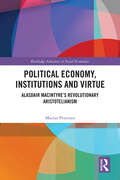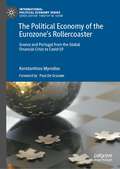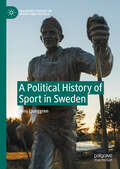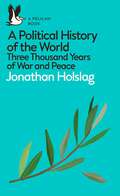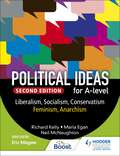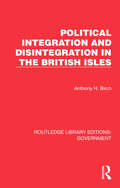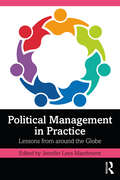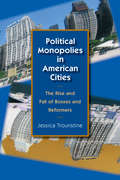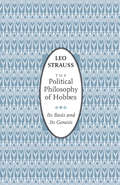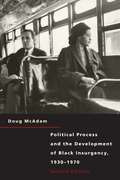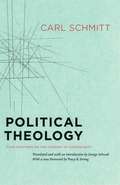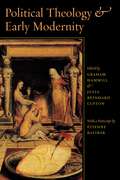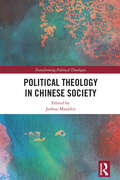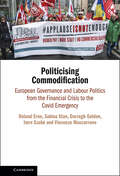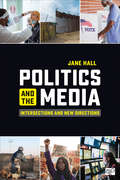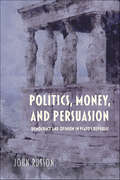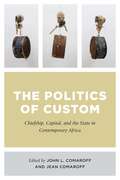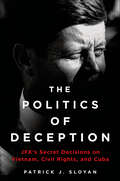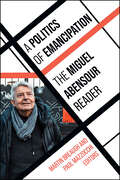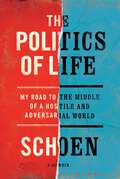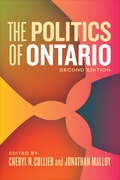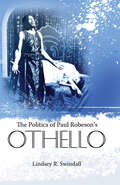- Table View
- List View
Political Economy, Institutions and Virtue: Alasdair MacIntyre’s Revolutionary Aristotelianism (Routledge Advances in Social Economics)
by Matías PetersenThis book engages with a radical critique of the modern state and the contemporary economic order: Alasdair MacIntyre’s ‘revolutionary Aristotelianism’ project. Central to this critique is the idea that the moral norms that markets and states tend to reproduce or reinforce are an obstacle to the development of practical judgement. The book outlines MacIntyre’s theory of practical reason and discusses some of the institutional arrangements that can be derived from it. It also explores the growing body of literature which has started to examine the extent to which alternative forms of social organisation might be more compatible with MacIntyre’s account of the virtues. This literature includes various proposals for alternative political and economic arrangements, ranging from certain forms of market socialism to the promotion of different forms of mutual and cooperative enterprises. Finally, the book offers an account of the type of institutional analysis required for the advancement of the revolutionary Aristotelianism project. This is achieved by showing how some key features of the Bloomington School of political economy are not only compatible with MacIntyre’s political philosophy, but also that a synthesis between neo- Aristotelian moral philosophy and the work of the Bloomington School offers a robust alternative for revolutionary Aristotelians. Thus, the book defends the idea that MacIntyre’s account of human flourishing is more likely to be realised, although imperfectly, in a polycentric social order. This book will be of interest to social scientists working in questions of political economy as well as political and moral philosophers.
The Political Economy of the Eurozone’s Rollercoaster: Greece and Portugal from the Global Financial Crisis to Covid-19 (International Political Economy Series)
by Konstantinos MyrodiasGlobal crises throughout history have shaken humanity and transformed economies and societies. The Eurozone faced two such crises soon after its foundation. This book brings new insights regarding the Eurozone’s response to the Global Financial Crisis in 2008 and the Covid-19 pandemic and its effectiveness in dealing with the macroeconomic imbalances in Europe. Is the Eurozone more resilient now? This book is an indispensable addition to the literature on the recent global crises and the Eurozone for both academics and policymakers who are eager to delve deeper into these vital questions.
A Political History of Sport in Sweden (Palgrave Studies in Sport and Politics)
by Jens LjunggrenThis book presents a history of Swedish sport, highlighting in particular the relationship between sport politics and people’s changing attitudes towards sport from the eighteenth century until today. It scrutinizes the interaction between sport politics and people’s different approaches to sport in everyday life. By investigating how different ways of pursuing and conceptualizing sport have progressed and interacted, and how they have influenced as well been influenced by sport politics, this book discerns the role of both governmental and municipal politics in the development of sport in Sweden.
A Political History of the World: Three Thousand Years of War and Peace (Pelican Books)
by Jonathan HolslagA three-thousand year history of the world that examines the causes of war and the search for peaceIn three thousand years of history, China has spent at least eleven centuries at war. The Roman Empire was in conflict during at least 50 per cent of its lifetime. Since 1776, the United States has spent over one hundred years at war. The dream of peace has been universal in the history of humanity. So why have we so rarely been able to achieve it? In A Political History of the World, Jonathan Holslag has produced a sweeping history of the world, from the Iron Age to the present, that investigates the causes of conflict between empires, nations and peoples and the attempts at diplomacy and cosmopolitanism. A birds-eye view of three thousand years of history, the book illuminates the forces shaping world politics from Ancient Egypt to the Han Dynasty, the Pax Romana to the rise of Islam, the Peace of Westphalia to the creation of the United Nations.This truly global approach enables Holslag to search for patterns across different eras and regions, and explore larger questions about war, diplomacy, and power. Has trade fostered peace? What are the limits of diplomacy? How does environmental change affect stability? Is war a universal sin of power? At a time when the threat of nuclear war looms again, this is a much-needed history intended for students of international politics, and anyone looking for a background on current events.
Political ideas for A Level: Liberalism, Socialism, Conservatism, Feminism, Anarchism 2nd Edition
by Richard Kelly Neil McNaughton Maria EganThese Student's Books will help students understand the core ideas and principles behind the political ideologies, and how they apply in practice to human nature, the state, society and the economy.- Comprehensive coverage of the ideologies of Liberalism, Socialism, Conservatism, Socialism, Feminism and Anarchism- Definitions of key terms and concepts to help clarify knowledge and understanding of political language- Exam focus sections at the end of each chapter to test and develop understanding of key topics, offering practice for short and long essay questions
Political ideas for A Level: Liberalism, Socialism, Conservatism, Feminism, Anarchism 2nd Edition
by Richard Kelly Neil McNaughton Maria EganThese Student's Books will help students understand the core ideas and principles behind the political ideologies, and how they apply in practice to human nature, the state, society and the economy.- Comprehensive coverage of the ideologies of Liberalism, Socialism, Conservatism, Socialism, Feminism and Anarchism- Definitions of key terms and concepts to help clarify knowledge and understanding of political language- Exam focus sections at the end of each chapter to test and develop understanding of key topics, offering practice for short and long essay questions
Political Integration and Disintegration in the British Isles (Routledge Library Editions: Government)
by Anthony H. BirchOriginally published in 1977, this book provided the first analysis of the processes of political integration and devolution within the British Isles, taking account of the social, economic and cultural factors involved as well as the unique character of the political system, together with the growth of Scottish and Welsh nationalism. The book contains both an analysis of the nationalist movements of Ireland, Ulster, Scotland and Wales and a critical assessment of the way British central Governments have reacted to these movements.
Political Management in Practice: Lessons from around the Globe
by Jennifer Lees-MarshmentAll organisations manage people, and politics is no different. Campaigns, parties, and government all need to manage people and resources to try to get things done. Of course, the extent to which politics is managed effectively is debatable. Recently public awareness of problematic HR in parliaments and government has grown as media reports of problems emerge. Such problematic practice is not surprising given that orientation and training of political practitioners by parties and parliament is hindered by a lack of academic research.This comprehensive volume lays out and builds upon core theoretical foundations in the field of political management, offering a wide range of in-depth empirical research with multiple authors and chapters from different disciplinary perspectives and countries. With authors from political management programmes, political marketing, management, political psychology, and public administration, the book seeks not just to survey a topic or existing literature, but to stimulate research in the area.This book will be highly useful for graduate students, researchers, and professionals in a variety of areas including political management, political marketing, applied politics, political science, management, political psychology, and public administration.
Political Monopolies in American Cities: The Rise and Fall of Bosses and Reformers
by Jessica TrounstineAround the same time that Richard J. Daley governed Chicago, greasing the wheels of his notorious political machine during a tenure that lasted from 1955 to his death in 1976, Anthony “Dutch” Hamann’s “reform” government centralized authority to similar effect in San Jose. In light of their equally exclusive governing arrangements—a similarity that seems to defy their reputations—Jessica Trounstine asks whether so-called bosses and reformers are more alike than we might have realized. Situating her in-depth studies of Chicago and San Jose in the broad context of data drawn from more than 240 cities over the course of a century, she finds that the answer—a resounding yes—illuminates the nature of political power. Both political machines and reform governments, she reveals, bias the system in favor of incumbents, effectively establishing monopolies that free governing coalitions from dependence on the support of their broader communities. Ironically, Trounstine goes on to show, the resulting loss of democratic responsiveness eventually mobilizes residents to vote monopolistic regimes out of office. Envisioning an alternative future for American cities, Trounstine concludes by suggesting solutions designed to free urban politics from this damaging cycle.
The Political Philosophy of Hobbes: Its Basis and Its Genesis
by Leo StraussIn this classic analysis, Leo Strauss pinpoints what is original and innovative in the political philosophy of Thomas Hobbes. He argues that Hobbes's ideas arose not from tradition or science but from his own deep knowledge and experience of human nature. Tracing the development of Hobbes's moral doctrine from his early writings to his major work The Leviathan, Strauss explains contradictions in the body of Hobbes's work and discovers startling connections between Hobbes and the thought of Plato, Thucydides, Aristotle, Descartes, Spinoza, and Hegel.
Political Process and the Development of Black Insurgency: 1930–1970
by Doug McAdamIn this classic work of sociology, Doug McAdam presents a political-process model that explains the rise and decline of the black protest movement in the United States. Moving from theoretical concerns to empirical analysis, he focuses on the crucial role of three institutions that foster protest: black churches, black colleges, and Southern chapters of the NAACP. He concludes that political opportunities, a heightened sense of political efficacy, and the development of these three institutions played a central role in shaping the civil rights movement. In his new introduction, McAdam revisits the civil rights struggle in light of recent scholarship on social movement origins and collective action. "[A] first-rate analytical demonstration that the civil rights movement was the culmination of a long process of building institutions in the black community."—Raymond Wolters, Journal of American History "A fresh, rich, and dynamic model to explain the rise and decline of the black insurgency movement in the United States."—James W. Lamare, Annals of the American Academy of Political and Social Science
Political Science class 12 - GSTB
by Gujarat State Board of School TextbooksThe political science curriculum provides an insightful overview of political parties and systems in India, emphasizing their crucial role in a democracy as intermediaries between the people and the government. It explores India's party system, particularly the historical one-party dominance of the Congress party. The text also examines challenges to Indian democracy, including social inequalities, literacy rates, regionalism, and terrorism, and suggests constitutional remedies. Additionally, it highlights India's contributions to the United Nations, the concept of peace, and conditions justifying war. Environmental issues are addressed, focusing on global protection efforts like the Stockholm conference. This comprehensive overview aims to enhance students' understanding of political and environmental issues in India and the world.
Political Theology: Four Chapters on the Concept of Sovereignty
by Carl SchmittWritten in the intense political and intellectual tumult of the early years of the Weimar Republic, Political Theology develops the distinctive theory of sovereignty that made Carl Schmitt one of the most significant and controversial political theorists of the twentieth century. Focusing on the relationships among political leadership, the norms of the legal order, and the state of political emergency, Schmitt argues in Political Theology that legal order ultimately rests upon the decisions of the sovereign. According to Schmitt, only the sovereign can meet the needs of an "exceptional" time and transcend legal order so that order can then be reestablished. Convinced that the state is governed by the ever-present possibility of conflict, Schmitt theorizes that the state exists only to maintain its integrity in order to ensure order and stability. Suggesting that all concepts of modern political thought are secularized theological concepts, Schmitt concludes Political Theology with a critique of liberalism and its attempt to depoliticize political thought by avoiding fundamental political decisions.
Political Theology & Early Modernity
by Étienne BalibarPolitical theology is a distinctly modern problem, one that takes shape in some of the most important theoretical writings of the twentieth and twenty-first centuries. But its origins stem from the early modern period, in medieval iconographies of sacred kinship and the critique of traditional sovereignty mounted by Hobbes and Spinoza. In this book, Graham Hammill and Julia Reinhard Lupton assemble established and emerging scholars in early modern studies to examine the role played by sixteenth- and seventeenth-century literature and thought in modern conceptions of political theology. Political Theology and Early Modernity explores texts by Shakespeare, Machiavelli, Milton, and others that have served as points of departure for such thinkers as Schmitt, Strauss, Benjamin, and Arendt. Written from a spectrum of positions ranging from renewed defenses of secularism to attempts to reconceive the religious character of collective life and literary experience, these essays probe moments of productive conflict, disavowal, and entanglement in politics and religion as they pass between early modern and modern scenes of thought. This stimulating collection is the first to answer not only how Renaissance and baroque literature help explain the persistence of political theology in modernity and postmodernity, but also how the reemergence of political theology as an intellectual and political problem deepens our understanding of the early modern period.
Political Theology in Chinese Society (Transforming Political Theologies)
by Joshua MauldinThis book provides an itinerary for studying political theology in Chinese society, including mainland China, Hong Kong, and Taiwan. It explores the changing role of religion in Chinese history, from the rise of Buddhism alongside Confucianism and Daoism, through the arrival of Christianity and Islam, to the suppression of religion under communism. Since the reform and opening period beginning in 1978, China has experienced a resurgence of religiosity, with powerful societal implications. Governing authorities have sought to regulate religious practice in line with their governing system. Political theology in Chinese society is very much in flux and the chapters in this volume provide an array of windows through which to view the evolving reality. They include historical approaches and descriptive analyses, with an interdisciplinary and international range of perspectives by contributors based in and outside China. The book will be of particular interest to scholars of theology, religious studies, and contemporary China studies.
Politicising Commodification: European Governance and Labour Politics from the Financial Crisis to the Covid Emergency
by null Roland Erne null Sabina Stan null Darragh Golden null Imre Szabó null Vincenzo MaccarroneThis book examines the new economic governance (NEG) regime that the EU adopted after 2008. Its novel research design captures the supranational formulation of NEG prescriptions and their uneven deployment across countries (Germany, Italy, Ireland, Romania), policy areas (employment relations, public services), and sectors (transport, water, healthcare). NEG led to a much more vertical mode of EU integration, and its commodification agenda unleashed a plethora of union and social-movement protests, including transnationally. The book presents findings that are crucial for the prospects of European democracy, as labour politics is essential in framing the struggles about the direction of NEG along a commodification–decommodification axis rather than a national–EU axis. To shed light on corresponding processes at EU level, it upscales insights on the historical role that labour movements have played in the development of democracy and welfare states. This title is also available as Open Access on Cambridge Core.
Politics and the Media: Intersections and New Directions
by Jane Hall"The book is well versed in the scholarly literature as well as pop-culture references found in contemporary television shows and movies. But what stands out in the volume’s research is its utilization of interviews conducted by the author that provide a range of perspectives on the media and politics from the vantage points of U.S. senators, journalists, critics, and activists." —Kirkus Reviews "Jane Hall has written a brilliant analysis that is educational, entertaining and important. Her comprehensive and timely book will be required reading for scholars, and will be invaluable for general readers and anyone interested in the relationship between politics and the media." - Kenneth T. Walsh, veteran White House correspondent, adjunct professorial lecturer in communication, and author of 10 books on the presidency including Presidential Leadership in Crisis. "Finally, as current a book as possible incorporating scholarly work on the media and politics and up-to-date examples and suggested exercises that are sure to rivet student interest. From its coverage of a tweeting President constantly assailing the media to trenchant analyses of coverage of the BLM movement, immigration and how the media treats women candidates this book is a must- adopt for Media and Politics classes. It is also an excellent add on for classes on American Politics and Campaigns and Elections." - Karen O’Connor, Jonathan N. Helfat Distinguished Professor of Politics, Founder Women and Politics Institute, American University. "The book is very timely and it has good case studies for students to discuss in class. It has chapters on race- and gender-related issues. You can use it as the main textbook, or you can assign it as supplementary reading material." —Ivy Shen, PhD. Southeast Missouri State University Politics and the Media: Intersections and New Directions examines how media and political institutions interact to shape public thinking and debates around social problems, cultural norms, and policies. From the roles of race and gender in American politics to the 2020 elections and the global coronavirus pandemic, this is an extraordinary moment for politicians, the news media, and democracy itself. Drawing from years of experience as an active political media analyst, an award-winning journalist and professor of politics and the media, Jane Hall explores how media technologies, practices, and formats shape political decision-making; how political forces influence media institutions; and how public opinion and media audiences are formed. Students will gain an understanding of these issues through a combination of scholarship, in-depth interviews, and contemporary case-studies that will help them develop their own views and learn to express them constructively.
Politics and the Media: Intersections and New Directions
by Jane Hall"The book is well versed in the scholarly literature as well as pop-culture references found in contemporary television shows and movies. But what stands out in the volume’s research is its utilization of interviews conducted by the author that provide a range of perspectives on the media and politics from the vantage points of U.S. senators, journalists, critics, and activists." —Kirkus Reviews "Jane Hall has written a brilliant analysis that is educational, entertaining and important. Her comprehensive and timely book will be required reading for scholars, and will be invaluable for general readers and anyone interested in the relationship between politics and the media." - Kenneth T. Walsh, veteran White House correspondent, adjunct professorial lecturer in communication, and author of 10 books on the presidency including Presidential Leadership in Crisis. "Finally, as current a book as possible incorporating scholarly work on the media and politics and up-to-date examples and suggested exercises that are sure to rivet student interest. From its coverage of a tweeting President constantly assailing the media to trenchant analyses of coverage of the BLM movement, immigration and how the media treats women candidates this book is a must- adopt for Media and Politics classes. It is also an excellent add on for classes on American Politics and Campaigns and Elections." - Karen O’Connor, Jonathan N. Helfat Distinguished Professor of Politics, Founder Women and Politics Institute, American University. "The book is very timely and it has good case studies for students to discuss in class. It has chapters on race- and gender-related issues. You can use it as the main textbook, or you can assign it as supplementary reading material." —Ivy Shen, PhD. Southeast Missouri State University Politics and the Media: Intersections and New Directions examines how media and political institutions interact to shape public thinking and debates around social problems, cultural norms, and policies. From the roles of race and gender in American politics to the 2020 elections and the global coronavirus pandemic, this is an extraordinary moment for politicians, the news media, and democracy itself. Drawing from years of experience as an active political media analyst, an award-winning journalist and professor of politics and the media, Jane Hall explores how media technologies, practices, and formats shape political decision-making; how political forces influence media institutions; and how public opinion and media audiences are formed. Students will gain an understanding of these issues through a combination of scholarship, in-depth interviews, and contemporary case-studies that will help them develop their own views and learn to express them constructively.
Politics, Money, and Persuasion: Democracy and Opinion in Plato's Republic (Studies in Continental Thought)
by John RussonIn Politics, Money, and Persuasion, distinguished philosopher John Russon offers a new framework for interpreting Plato's The Republic. For Russon, Plato's work is about the distinctive nature of what it is to be a human being and, correspondingly, what is distinctive about the nature of human society. Russon focuses on the realities of our everyday experience to come to profoundly insightful assessments of our human realities: the nature of the city, the nature of knowledge, and the nature of human psychology. Russon's argument concentrates on the ambivalence of logos, which includes reflections on politics and philosophy and their place in human life, how humans have shaped the environment, our interactions with money, the economy, and the pursuit of the good in social and political systems. Politics, Money, and Persuasion offers a deeply personal but also practical kind of philosophical reading of Plato's classic text. It emphasizes the tight connection between the life of city and the life of the soul, demonstrating both the crucial role that human cognitive excellence and psychological health play in political and social life.
The Politics of Custom: Chiefship, Capital, and the State in Contemporary Africa
by John L. Comaroff Jean ComaroffHow are we to explain the resurgence of customary chiefs in contemporary Africa? Rather than disappearing with the tide of modernity, as many expected, indigenous sovereigns are instead a rising force, often wielding substantial power and legitimacy despite major changes in the workings of the global political economy in the post–Cold War era—changes in which they are themselves deeply implicated. This pathbreaking volume, edited by anthropologists John L. Comaroff and Jean Comaroff, explores the reasons behind the increasingly assertive politics of custom in many corners of Africa. Chiefs come in countless guises—from university professors through cosmopolitan businessmen to subsistence farmers–but, whatever else they do, they are a critical key to understanding the tenacious hold that “traditional” authority enjoys in the late modern world. Together the contributors explore this counterintuitive chapter in Africa’s history and, in so doing, place it within the broader world-making processes of the twenty-first century.
The Politics of Deception: JFK's Secret Decisions on Vietnam, Civil Rights, and Cuba
by Patrick J. SloyanInvestigative reporter Patrick J. Sloyan, a former member of the White House Press Corps, revisits the last years of John F. Kennedy's presidency, his fateful involvement with Diem's assassination, the Cuban Missile Crisis and the Civil Rights Movement. Using recently released White House tape recordings and interviews with key inside players, The Politics of Deception reveals:Kennedy's secret behind-the-scenes deals to resolve the Cuban Missile Crisis.The overthrow and assassination of President Diem.Kennedy's hostile interactions with and attempts to undermine Martin Luther King, Jr. Kennedy's secret and fascinating dealings with Diem, General Curtis LeMay, King and Fidel Castro. Kennedy's last year in office, and his preparation for the election that never was.The Politics of Deception is a fresh and revealing look at an iconic president and the way he attempted to manage public opinion and forge his legacy, sure to appeal to both history buffs and those who were alive during his presidency.
A Politics of Emancipation: The Miguel Abensour Reader (SUNY series in Contemporary French Thought)
by Miguel AbensourDespite his influence in utopian studies and democratic theory, French philosopher Miguel Abensour (1939–2017) has yet to be fully discovered in the English-speaking world as only a fraction of his work has been translated. A Politics of Emancipation fills this void by translating a selection of his seminal essays into English for the first time. The Reader provides a systematic overview of Abensour's work and the two inseparable projects that govern his approach to political theory: on the one hand, a radical critique of all forms of domination and, on the other, a desire to conceptualize the political as the realm of freedom and emancipation. For Abensour, both projects are to be undertaken together in order to avoid the double trap of an evacuation of conflict from politics and the reduction of politics to a form of domination. In other words, a politics of emancipation requires a "ruthless" critique of domination coupled with an analysis of politics as the domain within which human beings experience freedom and equality.
The Politics of Life: My Road to the Middle of a Hostile and Adversarial World
by Douglas E SchoenDuring his more than 50 years in politics, Democratic strategist Douglas E. Schoen has produced nearly two dozen books that have deftly dissected national and international crises and offered prescriptions for solving them. Now, in The Politics of Life: My Road to the Middle of a Hostile and Adversarial World, Schoen delivers his most personal work. Bringing to life the antiwar youthquake of his Harvard years, Schoen introduces us to Cornel West, Walter Isaacson, Merrick Garland, and other classmates bound for glory. A tense summer in Mississippi helps Schoen appreciate the long game of candidate Charles Evers, a bootlegger-pimp turned civil rights crusader. In New York, he witnesses the twilight of clubhouse power as he canvasses for society swell Carter Burden, &“mob priest&” Louis Gigante, and Ed (How&’m doin&’?) Koch. Taking time out for his own run for Congress, Schoen joins data wunderkind Mark Penn in pioneering overnight polling – getting to know everyone from Camelot heir Ted Kennedy to crack-smoking mayor Marion Barry to a brash developer named Donald Trump. Penn & Schoen evolves into a global consultancy, taking on strongmen in Serbia, Mexico, Zimbabwe, Turkey, and Venezuela. Two of its clients are assassinated. Three win the Nobel Peace Prize. In 1996, the duo guides beleaguered President Bill Clinton to a second term and through a wrenching sex scandal. Using a unique strategy for micro-targeting voters, the firm helps give Mayor Michael Bloomberg the time he needs to steer New York City to a recovery after 9/11.A HALF-CENTURY IN POLITICS WAR STORIES AND WISDOM Schoen seems to be on top of the world when a British multinational pays a fortune for Penn & Schoen. Out on his own, he shrugs off a new generation of progressives who mock his centrist views and his willingness to debate conservatives on Fox News. Gradually, he reinvents himself. He becomes a syndicated columnist, co-founds a new polling company, immerses himself in Ukraine&’s struggle against Russia, and saddles up again with Michael Bloomberg to help oust now-President Trump. Along the way, some former critics admit Schoen might have been right. Brimming with ripping yarns from campaign war rooms, The Politics of Life is also a manual for living a productive and happy life. Sprinkled through the memoir are the author&’s &“Schoenisms&” – lessons he&’s learned the hard way: • It helps if your opinion is correct. But first, it should sound convincing. • Take on a despot when he first threatens you. Bullies only get bigger. • Martyrdom is overrated. Don't fall on any swords unless there&’s an ambulance on the way. • Shaming and blaming your opponents might impress your allies. But it doesn&’t accomplish much – aside from chasing people away from the bargaining table. • Don&’t waste time on feuds. Grudges sap your strength and hurt you almost as much as the person you&’re fighting. • Most people are mixtures of light and darkness. Life is about learning the moral gradients – the grayscale – and deciding how much shadow you can live with.
The Politics of Ontario: Second Edition
by Cheryl N. Collier Jonathan MalloyOntario is the most populous province in Canada and perhaps the most complex. It encompasses a range of regions, cities, and local cultures, while also claiming a long-standing pre-eminence in Canadian federalism. The second edition of The Politics of Ontario aims to understand this unique and ever-changing province. The new edition captures the growing diversity of Ontario, with new chapters on race and Ontario politics, Black Ontarians, and the relationship of Indigenous Peoples and Ontario. With contributors from across the province, the book analyses the political institutions of Ontario, key areas such as gender, Northern Ontario, the intricate Ontario political economy, and public policy challenges with the environment, labour relations, governing the GTA, and health care. Completely refreshed from the earlier edition, it emphasizes the evolution of Ontario and key public policy challenges facing the province. In doing so, The Politics of Ontario provides readers with a thorough understanding of this complicated province.
The Politics of Paul Robeson's Othello (Margaret Walker Alexander Series in African American Studies)
by Lindsey R. SwindallLindsey R. Swindall examines the historical and political context of acclaimed African American actor Paul Robeson’s three portrayals of Shakespeare’s Othello in the United Kingdom and the United States. These performances took place in London in 1930, on Broadway in 1943, and in Stratford-upon-Avon in 1959. All three of the productions, when considered together, provide an intriguing glimpse into Robeson’s artistry as well as his political activism. The Politics of Paul Robeson’s Othello maintains that Robeson’s development into a politically minded artist explicates the broader issue of the role of the African American artist in times of crisis. Robeson (1898–1976) fervently believed that political engagement was an inherent component of the role of the artist in society, and his performances demonstrate this conviction. In the 1930 production, audiences and critics alike confronted the question: Should a Black actor play Othello in an otherwise all-white cast? In the 1943 production on Broadway, Robeson consciously used the role as a form for questioning theater segregation both onstage and in the seats. In 1959, after he had become well known for his leftist views and sympathies with Communism, his performance in a major Stratford-upon-Avon production called into question whether audiences could accept onstage an African American who held radical—and increasingly unpopular—political views. Swindall thoughtfully uses Robeson’s Othello performances as a collective lens to analyze the actor and activist’s political and intellectual development.
